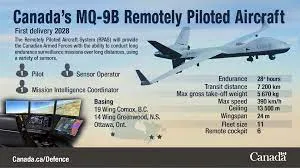Ottawa – Through Canada’s defence policy, Strong, Secure, Engaged, the Government of Canada is acquiring modern military equipment to keep Canadians safe and protected, and to support the security of our international allies and partners.
Marie-France Lalonde, Parliamentary Secretary for the Minister of National Defence, and Kody Blois, Member of Parliament for Kings—Hants, announced a major investment in the Royal Canadian Air Force on behalf of Bill Blair, Minister of National Defence, Jean-Yves Duclos, Minister of Public Services and Procurement, and François-Philippe Champagne, Minister of Innovation, Science and Industry.
Madame Lalonde and Mr. Blois announced that the Government of Canada will invest $2.49 billion to acquire a Remotely Piloted Aircraft System (RPAS) capability. The acquisition will be completed through a direct commercial sale contract with General Atomics Aeronautical Systems, Inc, with some specific components acquired through a Foreign Military Sale with the United States government.
The Remotely Piloted Aircraft System (RPAS) will provide the CAF with a large and sophisticated remotely piloted aircraft, roughly the size of a fighter jet. Unlike small drones, these Remotely Piloted Aircraft Systems will be designed and certified to the rigid airworthiness standards applicable to crewed aircraft.
This acquisition includes:
- eleven remotely piloted aircraft;
- six ground control stations;
- a new ground control centre;
- two new aircraft hangars;
- initial weapons;
- sustainment services;
- a training solution that includes training devices, mission crew and technician courseware;
- supporting information management and technology; and
- associated work and equipment.
The first delivery is anticipated in 2028 and the full operational capability by 2033.
At home, the RPAS capability will allow the CAF to monitor Canada’s large territory and long coastline. It will support civilian aid operations such as responding to forest fires and floods.
In deployed operations, an RPAS will provide commanders an overview of operational situations with near real-time information. The system will be capable of detecting, recognizing, identifying, tracking, and engaging targets in complex environments. It will also enable Canada to optimally fulfill its North American Aerospace Defense (NORAD) and NATO missions while increasing interoperability with U.S. and NATO forces. On top of enhancing these capabilities, the system will reduce the risk to personnel involved in combat operations on the ground, as well as aircrew. There is no risk to aircrew life if a remotely piloted aircraft is lost or damaged because of an incident or enemy attack.
This investments marks yet another significant milestone for the Royal Canadian Air Force, as we approach its 100th anniversary in 2024. Since 2022 alone, the Government of Canada has finalized the procurement or upgrade of approximately 140 new aircraft for the Royal Canadian Air Force, including:
- 88 new F-35 fighter jets,
- 9 new CC-330 Husky strategic tanker and transport aircraft,
- up to 16 new P-8A Poseidon multi-mission aircraft,
- 16 new or upgraded Cormorant helicopters (as the project will upgrade our fleet to provide Canada with the most advanced version of the helicopter); and
- 11 remotely piloted aircraft announced today.
These acquisitions demonstrate our commitment to recapitalizing the Royal Canadian Air Force, so that it can protect Canada for generations to come.
As part of this project, General Atomics will provide meaningful business activities and targeted investments to Canadian industry to support the growth of the aerospace and defence sector, including the remotely piloted systems and autonomous technologies industry. General Atomics’ economic benefits commitments to Canada as part of the acquisition contract have the potential to contribute close to 700 jobs annually for Canadian industry and value chain partners, and input $97 million annually to Canada’s gross domestic product over a nine-year period.
The RPAS aircraft will be stationed at 14 Wing Greenwood, NS, and 19 Wing Comox, BC. They will also be operated from a Forward Operating Location when supporting missions in northern Canada. The ground control centre, which will house the aircraft cockpits, will be located in Ottawa. New infrastructure will be built in Ottawa to house the ground control centre and will also be required to support RPAS operations at 14 Wing Greenwood, and 19 Wing Comox. Infrastructure costs are included in the overall project budget.
We expect that approximately 55 CAF and DND personnel will be stationed at 14 Wing Greenwood, 25 personnel at 19 Wing Comox, and 160 personnel at the ground control centre in Ottawa. Personnel will also be deployed to one of our Forward Operating Locations to support operations in Northern Canada, as required.
“At a time when defence and security needs are changing faster than ever, we must ensure Canada has a modern, adaptable military that is prepared to respond to evolving and emerging security challenges. Canada must meet the growing demand for domestic assistance while preserving our ability to defend Canada, protect North America, and support our allies. This Remotely Piloted Aircraft System capability will provide Canadian Armed Forces members with nimble response options during deployed operations, further contributing to their safety and effectiveness.” – Bill Blair, Minister of National Defence
“The Government of Canada is committed to providing the Canadian Armed Forces with the equipment they need to keep Canadians safe. This agreement to acquire the Remotely Piloted Aircraft System will expand Canada’s ability to modernize its military force, contribute to joint intelligence, surveillance and reconnaissance operations with its allies, and create good jobs in the aerospace and defence sector.” – Jean-Yves Duclos, Minister of Public Services and Procurement









